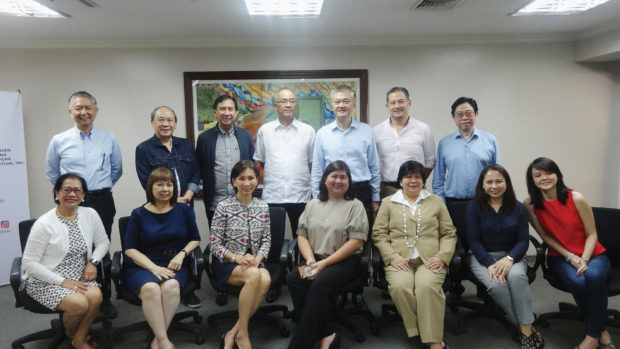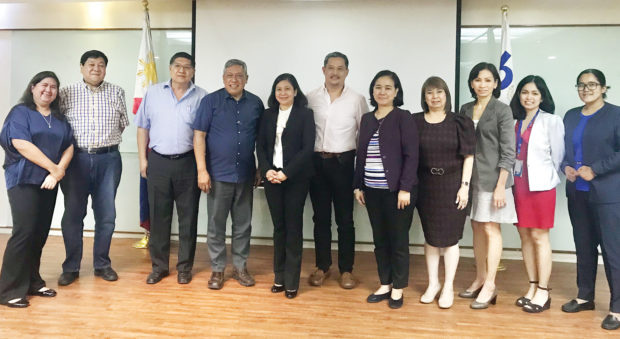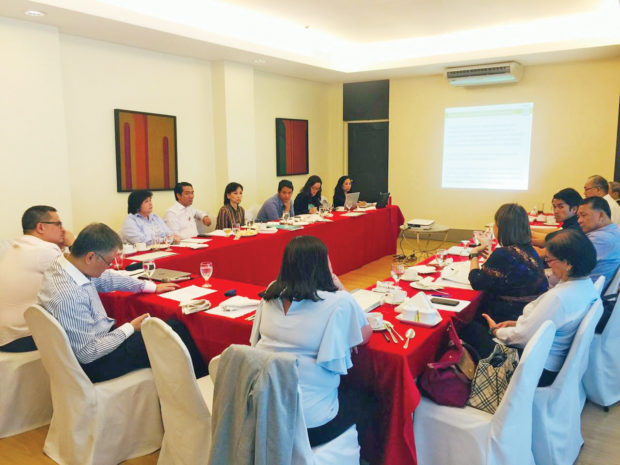SHDA Bullish on Resolving Housing Backlog
It has remained at the forefront of the Philippine housing industry for close to five decades.
Since its inception in 1970, the Subdivision and Housing Developers Association Inc. (SHDA) has remained true and committed to fulfilling its vision, not only for its members, but moreso for deserving Filipino families dreaming to have a home they can call their own. Despite the mounting challenges it continues to face, this leading organization of private developers has proven that it never once wavered from what it had sought to do.
And it’s no mere lip service.
SHDA is a national housing organization with 138 members from Metro Manila, 179 from eight regions, and 32 affiliate members—all contributing to providing adequate and decent housing to Filipinos. And for 49 years, SHDA has passionately pursued and advocated for laws and measures that have been instrumental in helping create a more conducive business environment for its industry players while enabling more Filipinos to have their own home.
Significant contributions
Among its most significant contributions to the industry are the group’s efforts in amending Sec. 20 of Republic Act No. 7279, deemed a game changer in addressing urban homelessness as it introduced a new category, which is socialized condominiums. The amended Sec. 20 introduced incentives “to encourage greater private sector participation in socialized housing and further reduce the cost of housing units for the benefit of the underprivileged and homeless.”
According to SHDA, it pioneered this concept since 2009 and had patiently made the rounds, presenting it to relevant state agencies including the Housing and Urban Development Coordinating Council (HUDCC), Department of the Interior and Local Government (DILG) and even to former Vice President Jejomar Binay, among others.
So far, both industry players and home buyers are already reaping the benefits of SHDA’s other contributions to the Philippine housing industry, such as the inclusion of mass housing under the Investment Promotions Plan, passage of pertinent laws, retention of tax incentives for mass housing, and critical partnerships with state-run agencies and other business organizations.
While SHDA already has a long, impressive list of accomplishments, it acknowledges the fact that much more remains to be done. Beyond being the “leading voice in articulating the advocacy of the housing industry in the Philippines,” SHDA seeks to be more relevant than
ever, banking on its partnerships, expertise of its members, and more notably, the experience, as the group has been witness to the country’s boom-and-bust economic cycles over the past decades.
New era
SHDA chairman Jeffrey Ng, along with the rest of the board, is now helping steer the organization toward a new era in the Philippine housing industry—one that is marked by a deep sense of urgency to serve the needs of a growing population.
“Our commitment to the Filipino market remains the same—we will go out of our way to build more affordable housing units so that every Filipino who doesn’t have a home yet will, in the next few years, be able to have their own home,” Ng noted. “We want to decrease, if not totally eliminate the housing backlog in the 10 years and so this really requires active involvement not only of the private sector but also of the government and other business organizations.”
He added: “We also want our members to be more dynamic and involved, to help coordinate with the proper government agencies and other business organizations so that we can make the housing industry grow faster and bigger.”
SHDA was also reorganized to prepare it for the new challenges that the industry is facing today, and what it will likely face in its next life. It likewise beefed up its information campaigns as it sought to make its voice heard better by the government, the private sector and civil society.
Partnerships
But Ng is under no illusion that addressing the growing housing backlog, now pegged at about 6.7 million units, will be a walk in the park.
Many administrations have long put housing high on its list of priorities, but the continued growth of the population, low incomes, the prohibitive costs of owning a home, scarcity of suitable land, and the general unattractiveness of engaging in the business of mass housing due to changing regulations have greatly hampered the capabilities of both the private and public sectors in addressing this backlog.
“We are working with business organizations together with the government agencies like the Department of Agrarian Reform (DAR) to, for example, speed up the process for land conversion from the previous norm of two to three years. Just last month, the DAR came out with a new administrative order to speed up the land conversion process and make it simpler. We would like this to be the start of a real and easier land conversion process in the country,” Ng said.
“Also, the Agricultural Free Patent Reform Law, which was signed into law by the President, should allow for faster transfer of free patents to third parties and buyers. This will enable them to mortgage with banks, so this would free up more land for housing especially for the socialized, economic and low-cost housing projects for the average Filipino,” he added.
Indeed, SHDA has its hands full, well with all the advocacies it has been pursuing over the years. And it is more than aware that there’s still a long road before it hits its lofty goal of eliminating this persistent challenge that is the housing backlog.
But just like its members, SHDA as an organization has aptly shown grit, tenacity and determination. It may not be
too long before the housing industry sees another significant turnaround in the years to come.
SHDA helps bridge the gap
Resolving the massive housing backlog has remained a formidable, chronic challenge that seem to worsen year after year.
Despite many landmark bills that have been enacted and the initiatives that have been rolled out in decades past, the housing backlog continues to swell, with latest estimates placing it at about 6.7 million units—a figure even seen surging to a whopping 12.3 million units by 2030, according to a study by the University of Asia and the Pacific. This means that if the country were to eliminate the backlog, housing production should reach 370,000 units yearly from 2016 to 2021, and about 1.12 million units a year from 2022 to 2030, based on the same report.
The reality, however, is nowhere near these numbers.
There is a long list of reasons that may have contributed to this problem, causing the backlog to even further balloon—from conflicting policies and regulations, uncertainties in the business environment, to new laws that adversely affect the industry and even external factors such as the cyclical economic and financial crises that had previously crippled many economies in the world.
Today, the Philippines continues to face the same festering problem that is the housing backlog, making it all the more elusive for more Filipinos to achieve their dreams of owning a home.
Closing the gap
The Subdivision and Housing Developers Association Inc. (SHDA), however, believes that its advocacy of helping close that gap is not a lost cause, as it continues to aggressively and relentlessly pursue for measures that are seen to significantly benefit the housing industry.
For instance, SHDA president Raphael B. Felix explained that the group, being the leading voice of the housing industry, is taking a more active role in the crafting of the implementing rules and regulations (IRR) for Republic Act No. 11201, which established the much awaited Department of Human Settlements and Urban Development (DHSUD). The said law seeks to consolidate housing agencies and create Housing One Stop Processing Centers, meant to rationalize and fast-track the processing and issuance of all requirements and related permits and licenses.
SHDA’s other advocacies include streamlining land conversion process, raising the price ceiling for socialized, economic and low-cost housing units, helping ensure a stable business environment, and retaining fiscal and nonfiscal incentives to drive more property developers to cater to these market segments, among others.
“SHDA is trying to iron out all obstacles so that things can be more efficient, and if we make the system more efficient for developers, there can be significant savings that we can pass on to our homebuyers. All these advocacies are crucial because it’s important for us to be able to provide homes to more Filipinos. While this is a business, it serves an even greater purpose,” Felix said.
“The housing industry has a big multiplier effect on the economy, for example, in terms of providing new jobs. When you house families, they themselves become more productive members of the society,” Felix further noted.“Having a home is a basic right. It gives one a certain sense of pride and fulfillment and uplifts the quality of lives of the families. We believe that providing homes to more Filipinos is part of nation building.”
Partnerships
Concerted efforts between the private sector and the government, however, will be crucial to keep the momentum and to more importantly curb, if not eliminate altogether, the housing backlog by 2030, as targeted under the SHDA Housing Roadmap. Based on this paper, the target was to produce 2 million homes from 2017 to 2022, and another 7 million from 2023 to 2030.
SHDA past chairman Willie J. Uy admitted that it won’t be easy to fix a backlog this big. But there are certain measures that the government can consider to make it easier for their members to build a house, and for Filipinos to buy their dream home.
“What we can do, and if the government is really serious about it, is to lessen the unnecessary regulations and make it easier for us to concentrate on housing production. As you know, the backlog is about 6.7 million, But how much can we build every year? Both the public and private sector can probably build, at most, 250,000 units a year but at this rate, I don’t think we’ll be able to achieve that—unless you give more incentives or try to lessen the enactment of new laws that will again slow down housing production. Everybody’s willing to build, but if we’re limited to certain things, how can we continue?” Uy noted.
The group likewise pointed out the need for the government to complement its P8-trillion “Build, Build, Build” infrastructure initiative with viable housing programs to be supported by adequate funding allocations. In this way, the government inches closer to achieving its goal of inclusive growth.
On top of all these, SHDA is further seeking to be accredited as the official private sector partner of the government in threshing out issues, enhancing the regulatory processes and crafting policies that will help address the chronic challenges plaguing the housing industry.
“We’d like to be known as the resource for the housing industry. We’d like to make sure that in our association, we really vet our members so that once you have the tag of being a SHDA member, it’s like a seal of good housekeeping. By doing so, we have, as a group, a big responsibility on our shoulders to help mold the newer, the smaller and the mom-and-pop developers from all over and mentor them to become responsible developers,” Uy explained.
At the same time, SHDA will be able to police its own members to ensure that everyone stringently complies with the different regulations set by the government. Hence, SHDA vows to continue its dialogue with the government and other business organizations as it seeks to become a true enabler in the housing industry, with the goal of eliminating the housing backlog by 2030. “That’s the relevance of SHDA—it has to continue being the leading voice of the housing industry with the hope and goal of providing a home for every Filipino,” Felix concluded.
SHDA: A true enabler of builders and homebuyers
Much may have changed over the last five decades, but the Subdivision and Housing Developers Association Inc. (SHDA) has undoubtedly remained true to its mission, performing impressively as a real estate and housing industry organization.
Its goal of being the leading voice of the housing industry, with the hope of providing a home for every Filipino, continues to resonate clearly across generations of leaders throughout SHDA’s 49 years of existence—enabling it, in critical times, to succeed in influencing government policymaking.
“From the time the group started out as Subdivision Owners Association of the Philippines Inc. (SOAP), SHDA was already helping solve problem after problem then. I think our history as SHDA was marked by cycles of crisis, although to this day, much had been already achieved to improve the housing industry and enable more Filipinos to have their own home,” explained former SHDA president Arch. Jose S. de Guzman.
According to De Guzman, SOAP was registered before the Securities and Exchange Commission in May 1970, with the goal of uniting subdivision owners and developers under one organization and help influence government policies, laws and regulations that could enhance the viability of the real estate sector consistent with public welfare.
While SOAP supported a program of housing for the homeless, this was undertaken indirectly since most members were focused on developing subdivisions without housing components. The typical practice then was to sell lots and the buyers are left to build their own homes.
Starting 1981, real estate developers gradually shifted from offering lots to house-and-lot packages as availing of housing loans from the Pag-Ibig Fund became available to a large number of prospective buyers. The lending program, however, started to falter three years after due to lack of funds and brought about by an ongoing political and economic crisis in the country.
When former President Corazon Aquino came into power, the administration reorganized the National Shelter Program as one of her priorities and signed a law to create the Housing and Urban Development Coordinating Council (HUDCC).
The National Shelter Program became a major inspiration for private developers to undertake large-scale mass housing developments for low- and middle-income members, such that the SOAP needed to reorganize and redirect its mission focusing much more on mass housing and less on subdivision lots only. By march 1987, SOAP officially became SHDA.
From 1987 to 1992, the Philippines had its first housing boom, with 400,000 housing units delivered and mortgage loans taken out. In April 1992, SHDA awarded then President Aquino with a plaque of recognition for the historically outstanding performance of her National Shelter Program, during the group’s first National Developers Convention.
In 1995, however, property developers had their second nightmare: having completed hundreds of housing units with prequalified buyers while the National Home Mortgage Finance Corp. (NHMFC), which ran out of funds due to inefficient collection, closing down its lending operations.
After persistent calls from SHDA for the resolution of the home lending crisis, former President Fidel Ramos responded by ordering the Pag-Ibig Fund to take over the NHMFC’s Unified Home Lending Program (UHLP) and to release the P7 billion in loan takeouts long overdue to developers. By early 1996, the crisis normalized and developers resumed their business until early 1998 when the Pag-Ibig Fund also ran out of funds due to severe collection problems.
By the end of 1999, the takeout overdue to developers ballooned P8 billion.
SHDA, in early 2000, thus proposed a credit risk sharing scheme between Pag-Ibig Fund and the developers which later on became known as the “Developer CTS 2000 Program.” This allowed the release of P8-billion receivables of the developers, and consequently, helped turn things back to normal for those in the housing industry. By 2001, problems concerning the housing program were more on bureaucratic delays in obtaining permits for housing projects.
SHDA then helped draft an executive order meant to streamline and speed up the permitting process for housing projects. This was Executive Order No. 45 signed by President Gloria Macapagal-Arroyo in October 2001. It significantly reduced the housing permitting process from an average of 24 months to only six months.
With the Developer CTS Program and the EO, the volume of housing production and loan takeouts from Pag-Ibig Fund rapidly grew every year from P3 billion in 2001 to P40 billion in 2009. In 2010, Pag-Ibig allocated a housing loan takeout budget of P50 billion. This created a record-breaking housing boom in the Philippines that became robust and sustainable for the last decade, contributing greatly to pump priming the economy, creating jobs and livelihood opportunities for Filipino people in addition to providing homes for the homeless.
The group is actively participating in the crafting of the implementing rules and regulations for the DHSUD, which would create a one-stop shop for the permitting process. Streamlining the cumbersome processes is expected to significantly help reduce the backlog.
SHDA pushed for Department of Agrarian Reform (DAR) Administrative Order No. 001 of 2019, which called for the streamlining of the requirements for land conversion. While this was still not exactly according to what SHDA advocated for, the said order was deemed a major step as the DAR no longer required a certification from the Department of Agriculture as part of its requirements for land conversion.
Cultivating stronger relations
Beyond board meetings, SHDA also engages in a number of activities for the benefit of both active members and its partners in the industry. These include regular business forums, participation in conferences and conventions, and even holding Christmas parties as well as golf tournaments wherein SHDA can share a light moment with friends in the industry—all of which are meant to further cultivate strong relationships.
Creating blueprint for progress
In 2012, SHDA launched the 2030 Housing Industry Roadmap, a blueprint that identified the challenges, outlined key initiatives, and proposed different policies and regulations that were needed to eliminate the housing deficit by 2030. This was in line with the Board of Investments’ roadmapping activity, meant to boost the competitiveness of Philippine industries. At present, SHDA is implementing the different strategies identified in the roadmap.
Nurturing relations with key partners
SHDA has sealed a number of key partnerships with state agencies and the private sector including with the League of Municipalities, for the provision of low cost and affordable housing for the underprivileged, as well as Holcim, Boysen and Jacinto Color Steel for preferential rates that can be availed exclusively by active SHDA members. It continues to nurture relationships with key housing agencies to help resolve the country’s massive housing backlog
Making a difference
SHDA made significant inroads in pushing for policies critical to the sustained growth of the housing industry including the Developer CTS 2000 Program, retention of income tax holiday under the Investment Priorities Plan, raising VAT ceiling exemptions, and the passage into law of Republic Act No. 11201, which established the Department of Human Settlements and Urban Development, among others.
ADVT.



